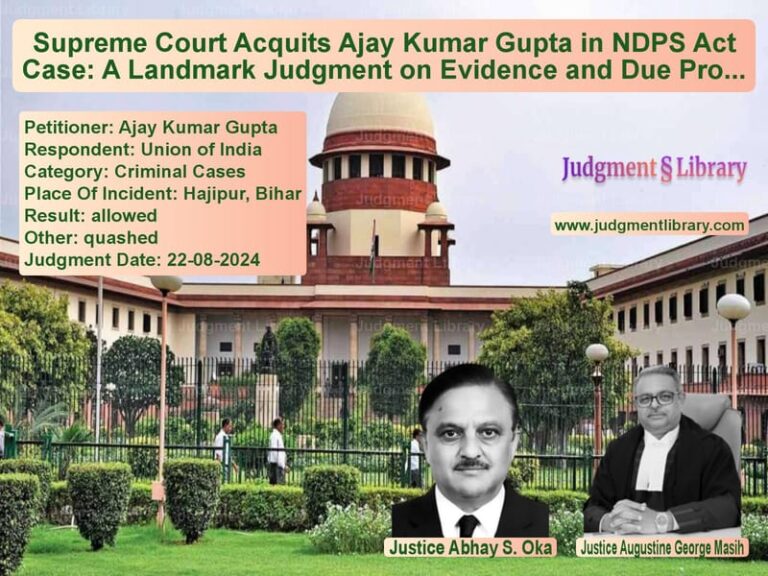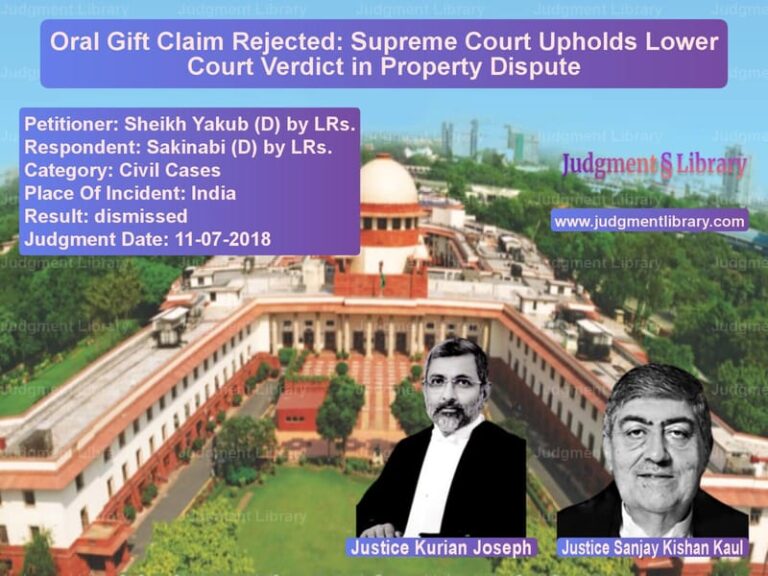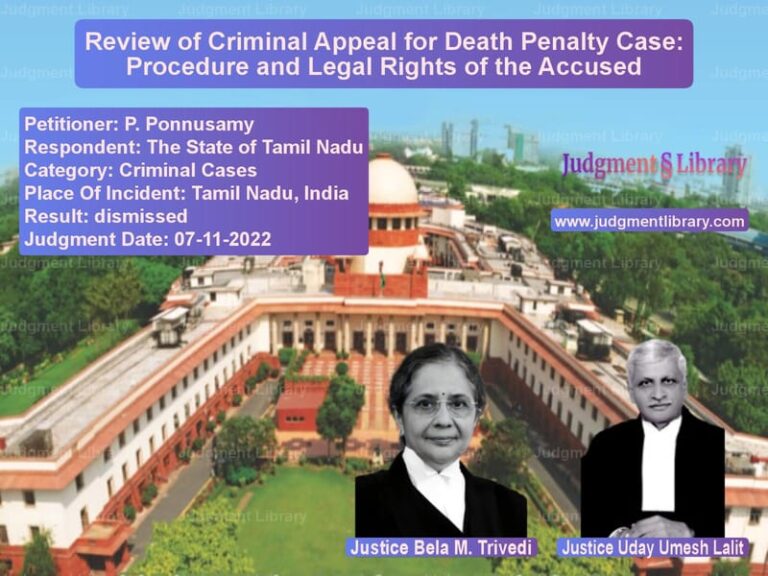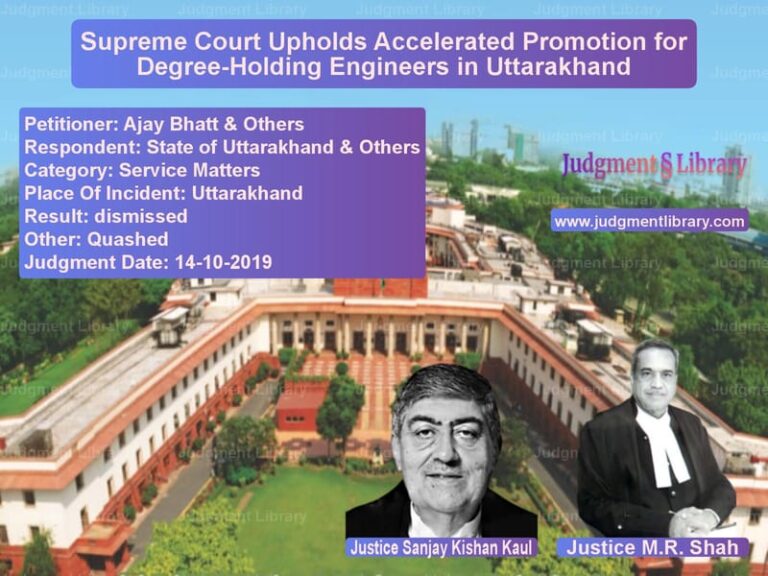Dacoity and Murder Case: Supreme Court Reduces Life Sentence to Ten Years
The Supreme Court of India, in its judgment in the case of Shajahan vs. State Rep. by Inspector of Police, addressed an appeal concerning a conviction under Section 396 IPC, which deals with dacoity and murder. The case revolved around a robbery at a pawn shop where the victim was strangled to death. The key legal question before the Court was whether the High Court was justified in enhancing the sentence from ten years to life imprisonment.
Background of the Case
On the intervening night of November 13-14, 2002, around 1:30 AM, the appellants—Basheer (A1), Shajahan (A2), and Babu @ Nawab Sahib (A4), along with two other accused, Raja Mohammad (A3) and Balu @ Balasubramanian (A5)—committed a robbery at a pawn shop owned by PW-1 Muthaiyah. During the robbery, the victim, Muthukrishnan, was strangled to death.
According to the prosecution:
- Shajahan (A2) tightly held the victim’s legs.
- Babu @ Nawab Sahib (A4) sat on the victim’s chest and strangled him with a jute rope.
- The other accused looted around 4.788 kg of gold and 5.595 kg of silver, worth approximately ₹12,00,000.
The crime was discovered the following morning when PW-4, a sweeper at the pawn shop, informed PW-1 that Muthukrishnan was found dead. PW-1 lodged a complaint at the Mandharakuppam Police Station, and a case was registered under Sections 457, 380, and 302 IPC.
Investigation and Arrests
On February 6, 2003, the police arrested Raja Mohammad (A3) and recovered a sum of ₹46,000 based on his confession. Further recoveries of stolen jewelry were made from multiple locations, including a jewelry shop in Mumbai.
On the same day, Basheer (A1) and Shajahan (A2) were arrested while riding a TVS-50 motorcycle. Their confession led to the recovery of stolen jewelry hidden in a cover on the petrol tank of the vehicle.
Trial Court Judgment
The Sessions Court found all five accused guilty under Section 396 IPC and sentenced them to ten years of rigorous imprisonment. The court held that since the accused were convicted for dacoity with murder, there was no need for a separate conviction under Section 302 IPC.
High Court’s Decision
The accused appealed their conviction, while the prosecution sought an enhancement of the sentence. The Madras High Court upheld the conviction but increased the sentence from ten years to life imprisonment. The High Court reasoned that dacoity with murder should be treated with utmost seriousness and that the sentence imposed by the trial court was inadequate.
Supreme Court’s Observations
The Supreme Court, after reviewing the case, noted that while the offense under Section 396 IPC was serious, it did not warrant a life sentence in this instance. The Court observed:
“Though the offense under Section 396 IPC is to be viewed with seriousness, for the conviction under Section 396 IPC, larger discretion is vested with the court insofar as there is a possibility of imposing a penalty lesser than death or imprisonment for life.”
The Court further noted that:
“The accused were not armed. Accused Babu @ Nawab Sahib is alleged to have sat on deceased Muthukrishnan and pressed his nose and mouth and is alleged to have tightened his neck with the rope. The occurrence was of the year 2002. Considering the long lapse of time and the facts and circumstances of the case, the sentence of imprisonment for life is modified as ten years as directed by the trial court.”
Final Judgment and Directions
- The Supreme Court set aside the High Court’s order enhancing the sentence to life imprisonment.
- The Court restored the original sentence of ten years of rigorous imprisonment as imposed by the trial court.
- The accused were ordered to be released forthwith since they had already served more than ten years in custody.
Implications of the Judgment
This ruling has significant implications for the interpretation of Section 396 IPC. It establishes that while dacoity with murder is a serious offense, sentencing should be proportional to the circumstances. The ruling also highlights the Court’s approach in distinguishing between armed and unarmed dacoity, influencing future cases involving similar offenses.
Conclusion
The Supreme Court’s decision in this case provides a balanced approach to sentencing in dacoity and murder cases. It ensures that judicial discretion is exercised in a fair manner while maintaining the seriousness of the offense. The ruling upholds the principles of justice, fairness, and proportionality in criminal sentencing.
Petitioner Name: ShajahanRespondent Name: State Rep. by Inspector of PoliceJudgment By: Justice Ranjan Gogoi, Justice R. BanumathiJudgment Date: 16-02-2018
Don’t miss out on the full details! Download the complete judgment in PDF format below and gain valuable insights instantly!
Download Judgment: Shajahan vs State Rep. by Inspec Supreme Court of India Judgment Dated 16-02-2018.pdf
Direct Downlaod Judgment: Direct downlaod this Judgment
See all petitions in Murder Cases
See all petitions in Theft and Robbery Cases
See all petitions in Attempt to Murder Cases
See all petitions in Judgment by Ranjan Gogoi
See all petitions in Judgment by R. Banumathi
See all petitions in partially allowed
See all petitions in Modified
See all petitions in supreme court of India judgments February 2018
See all petitions in 2018 judgments
See all posts in Criminal Cases Category
See all allowed petitions in Criminal Cases Category
See all Dismissed petitions in Criminal Cases Category
See all partially allowed petitions in Criminal Cases Category







